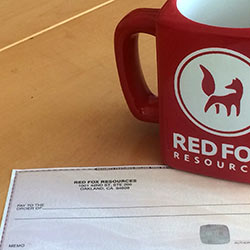Why Recycle DPFs, DOCs and TWCs?
Because It's Good for Your Business and Good for America
Why Recycle Emission Control Parts (DPFs, DOCs, TWCs)?
Many people don’t realize that DPFs and DOCs can be recycled and that it makes good business sense to do so. Below is a summary of why recycling makes sense and how it can benefit your company.
The Monetary Value of DPFs and DOCs When Recycled
 Most DPFs and DOCs are coated or “catalyzed” with Platinum Group Metals (PGM) in order for the chemistry in the exhaust stream to mix correctly and ensure that engines meet CARB and EPA emission reduction requirements. PGM in DPFs and DOCs can be recovered and recycled by a specialized diesel emission component recycler like Red Fox. Red Fox purchases failed DPFs/DOCs to recover the PGM material. A failed or spent DPF or DOC can typically be worth $25-$900. The alternatives to recycling are:
Most DPFs and DOCs are coated or “catalyzed” with Platinum Group Metals (PGM) in order for the chemistry in the exhaust stream to mix correctly and ensure that engines meet CARB and EPA emission reduction requirements. PGM in DPFs and DOCs can be recovered and recycled by a specialized diesel emission component recycler like Red Fox. Red Fox purchases failed DPFs/DOCs to recover the PGM material. A failed or spent DPF or DOC can typically be worth $25-$900. The alternatives to recycling are:
- Scrapping it and earning roughly $0.15 -$3.00 per part
- Tossing it in a dumpster (which could also put your company at risk of improperly handling hazardous waste)
- Paying to have it removed (i.e. local refuse company)
No good business would choose to continually pay a refuse/waste company to haul off recoverable assets worth $25-$900.
Learn About Recycled DPF and DOC Pricing | The Ultimate Guide to DPF Recycling
Recycling DPFs and DOCs Keeps Prices Down for New Parts
Manufacturers talk a lot about developing a “sustainable supply chain.” A sustainable supply chain makes great business sense for manufacturers because producing products with reusable materials can be cheaper than using all-new components, reduces waste, and ensures long-term availability of products. Recycling DPFs and DOCs is a perfect example of how businesses can promote a sustainable supply chain while keeping down costs for new parts.
As engine manufacturers continue to make engines with catalyzed DPFs, they’ll continue to pressure their upstream DPF suppliers for lower prices. The DPF manufacturers are also looking upstream to the raw materials suppliers of PGM for lower prices, but the PGM prices are tied to the market commodity price. Assuming continued demand for the material is consistent, the only other lever to pull to keep the price down is to increase the supply; providing the catalyst suppliers with recovered PGM that would otherwise have been landfilled or is sitting on shop floors around the country is a great way promote sustainability and keep costs for new parts down.
When a fleet, equipment owner or dealer recycles DPFs or DOCs they are promoting sustainability (reducing the need to mine new material) and bolstering the supply of a scarce product, thus keeping in check the price for the new DPFs, DOCs and TWCs.
Recycling DPFs Is Good for American Business
More than 90% of global platinum is mined OUTSIDE of North America, primarily in South Africa and Russia. Material that is recycled from heavy-duty applications through Red Fox is processed and sold exclusively to domestic suppliers of PGM, keeping the material in America and reducing the reliance on foreign suppliers.
